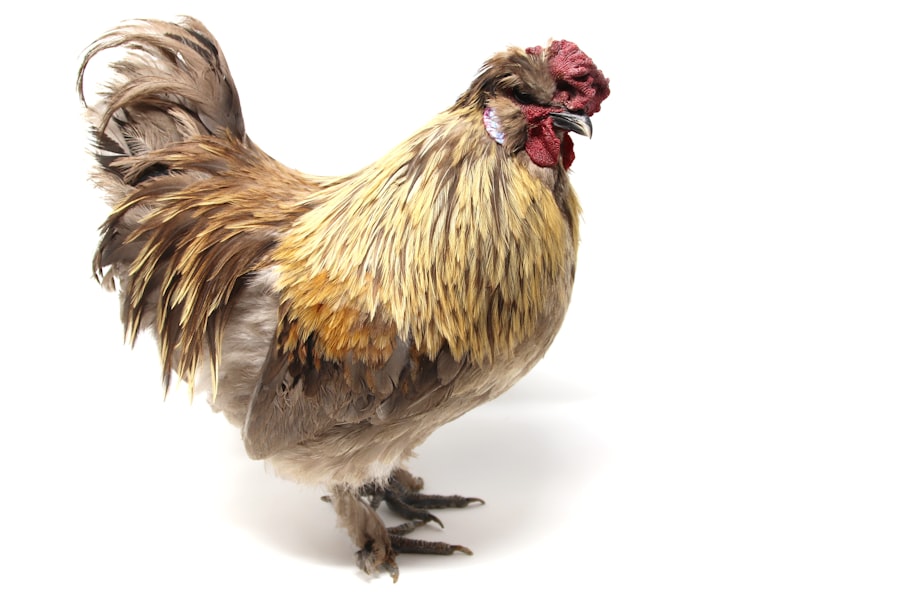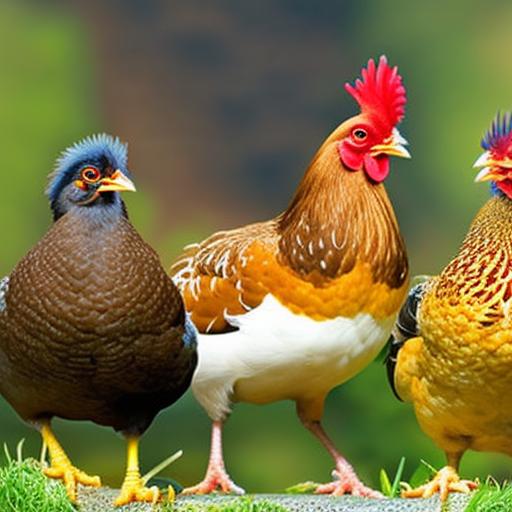Keeping chickens at home has become increasingly popular in recent years, and for good reason. Not only do chickens provide a sustainable source of fresh eggs and meat, but they also offer a unique and rewarding experience for homeowners. Personally, I have been keeping chickens in my backyard for the past five years, and it has been a truly enriching experience. Not only do I enjoy the daily routine of caring for my flock, but I also appreciate the many benefits that come with having chickens at home.
Key Takeaways
- Keeping chickens at home can be a rewarding and sustainable hobby.
- Choosing the right breed is important for egg-laying, meat production, or dual-purpose.
- Best egg-laying chickens include Leghorns, Rhode Island Reds, and Australorps.
- Best meat chickens include Cornish Cross and Freedom Rangers.
- Dual-purpose chickens like Plymouth Rocks and Wyandottes are great for both eggs and meat.
Choosing the Right Breed for Your Needs
When it comes to keeping chickens, one of the most important decisions you will make is choosing the right breed for your needs. There are three main types of chicken breeds: egg-laying, meat, and dual-purpose. Egg-laying breeds, as the name suggests, are known for their ability to produce a large number of eggs. Meat breeds, on the other hand, are bred specifically for their meat production. Dual-purpose breeds are a combination of both egg-laying and meat qualities.
It is crucial to choose a breed that fits your needs and lifestyle. If you are primarily interested in having a steady supply of fresh eggs, then an egg-laying breed such as the Rhode Island Red or Leghorn would be a good choice. On the other hand, if you are more interested in raising your own meat, then a meat breed like the Cornish Cross or Plymouth Rock would be more suitable. Dual-purpose breeds like the Sussex or Wyandotte can provide both eggs and meat, making them a versatile option.
Best Egg-Laying Chickens for Home Flocks
If you are looking to have a consistent supply of fresh eggs, there are several chicken breeds that are known for their excellent egg-laying abilities. The Rhode Island Red is one of the most popular choices for backyard flocks due to its high egg production and hardiness. Another great option is the Leghorn, which is known for its large white eggs and active nature. Other breeds that are known for their egg-laying abilities include the Australorp, Sussex, and Plymouth Rock.
Having chickens that lay eggs regularly has many benefits. Not only do you have a constant supply of fresh eggs, but you also have the satisfaction of knowing exactly where your food comes from. Additionally, eggs from backyard chickens are often considered to be healthier and more nutritious than store-bought eggs, as they are typically free from antibiotics and hormones.
Best Meat Chickens for Home Flocks
If you are interested in raising your own meat chickens, there are several breeds that are specifically bred for their meat production. The Cornish Cross is one of the most popular meat breeds due to its fast growth rate and high meat yield. Another popular choice is the Plymouth Rock, which is known for its flavorful meat and calm temperament. Other meat breeds include the Jersey Giant, Orpington, and Sussex.
Raising your own meat chickens has many benefits. Not only do you have control over the quality of the meat you consume, but you also have the satisfaction of knowing that your food was raised humanely and sustainably. Additionally, raising your own meat chickens can be a cost-effective option compared to purchasing meat from the store.
Dual-Purpose Chickens for Home Flocks
If you are looking for a versatile option that can provide both eggs and meat, dual-purpose breeds are a great choice. These breeds are typically larger in size and have good egg-laying abilities as well as decent meat quality. Some popular dual-purpose breeds include the Sussex, Wyandotte, Rhode Island Red, and Plymouth Rock.
Having dual-purpose chickens offers the best of both worlds. You can enjoy a steady supply of fresh eggs while also having the option to raise your own meat if desired. This flexibility can be especially beneficial for those who have limited space or are unsure of their specific needs.
Tips for Building a Chicken Coop

When keeping chickens at home, it is essential to have a safe and secure coop for them to live in. A well-designed coop not only protects your chickens from predators but also provides them with a comfortable and healthy living environment. When building a chicken coop, there are several important factors to consider.
Firstly, make sure the coop is well-ventilated to prevent the buildup of moisture and ammonia. This can be achieved by incorporating windows or vents into the design. Additionally, the coop should have adequate insulation to keep the chickens warm in the winter and cool in the summer.
Secondly, consider the size of the coop. The general rule of thumb is to provide at least 4 square feet of space per chicken. However, if you have larger breeds or plan to keep your chickens confined to the coop for extended periods, it is recommended to provide more space.
Lastly, make sure the coop is easy to clean and maintain. This can be achieved by incorporating features such as removable roosts and nesting boxes, as well as easy access to food and water.
Coop Size and Design Considerations
The size and design of your chicken coop will depend on the size of your flock and your specific needs. As mentioned earlier, it is recommended to provide at least 4 square feet of space per chicken. However, if you have larger breeds or plan to keep your chickens confined to the coop for extended periods, it is best to provide more space.
In terms of design, there are several considerations to keep in mind. Firstly, make sure the coop has a secure roof and walls to protect your chickens from predators such as raccoons or foxes. Additionally, consider incorporating windows or vents for ventilation purposes.
When it comes to aesthetics, there are many design options available. Some people prefer a more rustic or natural look, while others prefer a more modern or sleek design. Ultimately, the design of your coop should reflect your personal style and blend in with the overall aesthetic of your backyard.
Feeding and Watering Your Chickens
Feeding and watering your chickens properly is crucial for their health and well-being. There are several types of chicken feed available, including pellets, crumbles, and mash. Each type has its own nutritional value, so it is important to choose a feed that meets the specific needs of your flock.
In addition to commercial feed, chickens also require access to fresh water at all times. It is important to provide clean water in a container that is large enough for all of your chickens to drink from comfortably. Additionally, make sure to clean and refill the water container regularly to prevent the buildup of bacteria.
Health and Safety Concerns for Chickens
Like any other animal, chickens are susceptible to various health issues. Some common health concerns for chickens include respiratory infections, parasites, and egg-laying problems. It is important to be proactive in preventing these issues by providing a clean and sanitary living environment for your chickens.
Regularly cleaning the coop, providing fresh bedding, and practicing good biosecurity measures can help prevent the spread of diseases. Additionally, providing a balanced diet and ensuring that your chickens have access to fresh water can help support their overall health.
If you notice any signs of illness or abnormal behavior in your chickens, it is important to seek veterinary care as soon as possible. Early detection and treatment can often prevent more serious health issues from developing.
Conclusion and Final Thoughts on Keeping Chickens at Home
In conclusion, keeping chickens at home offers a wide range of benefits. Not only do they provide a sustainable source of fresh eggs and meat, but they also offer a unique and rewarding experience for homeowners. By choosing the right breed for your needs, building a safe and secure coop, and providing proper care and nutrition, you can enjoy the many joys of keeping chickens at home.
Personally, I have found great joy in caring for my flock of chickens. From collecting fresh eggs each morning to watching them roam freely in the backyard, the experience has been truly enriching. I encourage anyone who is considering keeping chickens at home to take the leap and experience the many benefits that come with it. Whether you are interested in having a steady supply of fresh eggs or raising your own meat, keeping chickens at home is a rewarding and fulfilling endeavor.
If you’re considering keeping chickens at home, it’s important to choose the right breed that suits your needs. In a recent article by Poultry Wizard, they discuss the best chickens to keep for a family of four. They provide valuable insights on how many chickens you would need to meet your family’s egg consumption and which breeds are known for their productivity. To learn more about this topic, check out their article on how many chickens you need for a family of 4. Additionally, if you’re interested in building a chicken coop in Grand Island, Nebraska, Poultry Wizard has another informative article that provides tips and guidance on creating the perfect coop. You can find it at chicken coop in Grand Island, NE. Lastly, if you’re also considering keeping quails and want to know what vegetables they eat, Poultry Wizard has an article that covers this topic as well. Discover more about what vegetables quails eat and ensure your quails have a balanced diet.
FAQs
What are the best chickens to keep at home?
The best chickens to keep at home are those that are docile, friendly, and easy to care for. Some popular breeds include Rhode Island Reds, Plymouth Rocks, Sussex, and Orpingtons.
What are the benefits of keeping chickens at home?
Keeping chickens at home can provide a source of fresh eggs, fertilizer for your garden, and entertainment. Chickens are also relatively low-maintenance pets and can be a great way to teach children about responsibility and animal care.
What do chickens need to be healthy and happy?
Chickens need access to fresh water, a balanced diet, and a clean living environment to be healthy and happy. They also need plenty of space to roam and exercise, as well as protection from predators.
How much space do chickens need?
Chickens need at least 4 square feet of indoor space and 10 square feet of outdoor space per bird to be healthy and happy. However, more space is always better, and providing ample space can help prevent behavioral problems and health issues.
What should I feed my chickens?
Chickens need a balanced diet that includes a mix of grains, protein, and vitamins and minerals. Commercial chicken feed is a good option, but you can also supplement their diet with fresh fruits and vegetables, mealworms, and other treats.
Do chickens require a lot of maintenance?
Chickens are relatively low-maintenance pets, but they do require some care. You will need to provide them with fresh water and food daily, clean their coop regularly, and monitor their health for signs of illness or injury. However, with proper care, chickens can be a rewarding and enjoyable addition to your home.
Meet Walter, the feathered-friend fanatic of Florida! Nestled in the sunshine state, Walter struts through life with his feathered companions, clucking his way to happiness. With a coop that’s fancier than a five-star hotel, he’s the Don Juan of the chicken world. When he’s not teaching his hens to do the cha-cha, you’ll find him in a heated debate with his prized rooster, Sir Clucks-a-Lot. Walter’s poultry passion is no yolk; he’s the sunny-side-up guy you never knew you needed in your flock of friends!







